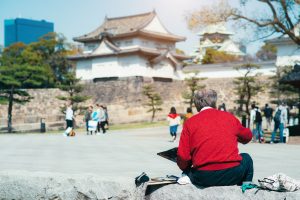In Japan, seniors are at the top of the social hierarchy. It’s a tradition that has led to a national holiday dedicated to the elderly to honor their contributions to society. But at the same time, seniors are also preparing to work “forever,” re-entering the workforce, and taking up low paid jobs in order to survive.
Japan is aging faster than any other country in the world. The national pension system is under immense pressure to sustain an growing number of elderly while the number of people contributing to the system dwindles. As of 2020, the number of Japanese over 65 reached a record high of 36 million, or 29 percent of the total population of 125 million. This figure is twice as high as it was 25 years ago, and it’s expected to increase to 35 percent by 2040, according to the National Institute of Population and Social Security Research.
In a related development, in 2021 the number of people over 75 in need of “final stage” medical care increased by 720,000 to 20 million in total.
Japan’s poverty line survey conducted in 2019 determined that a minimum annual income of approximately $10,000 is needed to purchase daily essentials. However, seniors over 65 receive an annual basic pension of roughly $6,000 or $460 each month, which is not enough to cover daily expenses.
Women are disproportionately vulnerable to poverty in old age compared to their male counterparts. Japan boasts one of the highest life expectancies in the world, with women at 87 years and men at 81. The poverty rate for elderly women is expected to increase to 25 percent from 22 percent, but this figure jumps to 50 percent for divorced and unmarried women. In contrast, only 10 percent of men are predicted to fall into poverty.
This discrepancy is because the pension system was designed in the post-war era, when the social assumption was that women would leave their full time jobs after marriage to bear and raise children while their husbands worked under a lifetime employment system with generous employee benefits. In turn, the pension system rewarded households with married couples and put them on course for post-retirement financial security.
Divorcees, unmarried women, and single mothers, on the other hand, face financial insecurity in their later years as single incomes lower retirement savings. Changing family dynamics also mean elderly women tend to live alone away from their adult children, raising the risk of isolation, food insecurity, homelessness, and early death.
The government is working to shift society toward “lifelong work” in an effort to tackle Japan’s severe labor shortage and have the elderly to foot more of their medical and nursing bills. The Fiscal System Council is considering raising the pensionable age to 68.
In principle the retirement age is 65 but the employment rate among Japanese seniors is the second highest in the world, behind only South Korea. It’s an unconventional conundrum, in which seniors are highly driven to work to supplement their meager pensions.
Japan’s White Paper on an Aging Society found very high eagerness to work, with 40 percent of seniors in favor of continuing to earn an income compared to 30 percent in the United States and 28 percent in Germany. Currently one in four elderly, or approximately 9 million, undertake informal part-time work as cleaners, security guards, couriers, or drivers, mostly in wholesale or the retail sector. This is in stark contrast to 18 percent and 10 percent of seniors employed in the United States and the United Kingdom, respectively.
But expanding senior employment raises questions around whether and to what extent seniors are capable of working in old age. The expansion of senior employment could force individuals to take on work despite poor and deteriorating health.
Japan is facing a serious economic and demographic timebomb. The challenge will be reforming the social security system in a way that secures a minimum standard of living for seniors while reducing the burden on future generations.

































